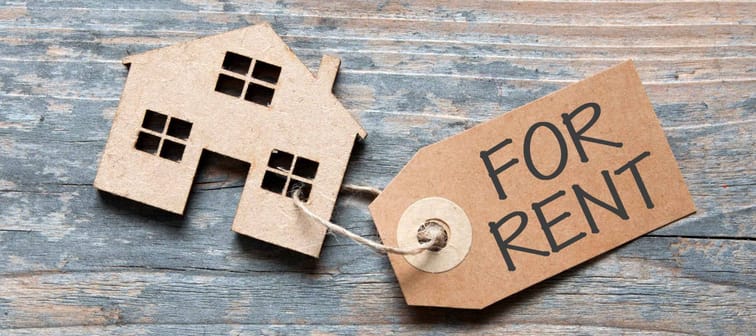Rent prices across Canada for September 2023

How much should you spend on rent? The 30% rule of thumb
An old axiom holds that we shouldn’t spend more than 30% of our gross (pre-tax) income on rent, and that’s still apparently true, even with the rising housing costs across the country.
“No more than 25 to 30% of your income should be going to rent, but while it’s important to have a baseline like that, it’s also about understanding the city you’re in and whether you can get creative with sharing or reducing your costs, like with a roommate,” says personal finance expert and author Kelley Keehn.
Before you go apartment hunting, she recommends using a website like calculator.net. If you type in your annual income, the site will show you your optimum rent expenditure, your suggested minimum and your suggested maximum. The recommendations are based on the 30% rule and the site does caution you with a red warning if your rental budget strays too far from the recommended maximum.
For example, if you make $60,000 per year in gross income, and have no debt, your rent should be between $1,400 and $1,800. Keep in mind, some landlords may not accept applications with more than 1/3 of your gross income on rent. So, if you're making an average Vancouver salary, you're spending almost 60% of your gross on rent—not good.
But with rent so high in most Canadian cities, is 30% still even a realistic possibility? Noel D’Souza, a Toronto-based, fee-only advisor for Money Coaches Canada says it can be, with a few caveats.
“Before you figure out what you can afford to put aside for rent, you need to do a budget in general. And if 30% doesn’t seem like it’s enough to leave room for savings and investing, make sure to put those two quadrants in your budget as well,” says D’Souza.
‘Just budget’ may seem like hollow advice parroted over and over and over again, but D’Souza says the part most people find overwhelming is tracking their spending, and that’s how they drop off from keeping a budget. (If you need help keeping tabs on your spending, try out one of our picks for the best budgeting apps.
“When I meet my clients and we do a budget, I don’t get them to track their spending. Instead, I get them to allocate a certain amount of income to each part of that pie and once that money runs out, that money is gone for the next two weeks until pay day,” says D’Souza.
“This relieves the pressure that comes with tracking and allows people to get really honest about their wants and needs. As they start to really see what they’re spending their money on, they can suddenly see what spending can be eliminated and where that money can be re-allocated, like rent for example.”
D’Souza says it comes down to priorities and what you really want out of life. To obtain nicer housing, you might be willing to sacrifice in other areas or get creative with how you can afford to live.
Getting creative
Rising rents mean budgets are getting tighter for everyone, making creative budgeting a necessity. For single Canadians, D’Souza’s classic budgeting solution is to mimic the economic output of a couple: get a roommate or two to split the rental cost.
“You might also want to look for buildings offering rent-controlled units or apply to co-op or other housing alternatives offering rent-geared-to-income,” says D’Souza.
Since May 30, 2017, landlords of private rental units in Ontario cannot increase rent by more than the rate set each year by the Provincial Government’s Rent Increase Guideline. For 2022, that rate is set at 1.2%. In B.C., rent can only be increased once a year according to provincial regulations and the maximum increase can’t exceed the rate of inflation. In 2022, the maximum allowable rental increase in B.C. is 1.5%. Always check applicable laws to see if rent control legislation exists in your province.
Some Canadians go in search of cheaper rent by moving further and further from the major cities where they work. While this may reduce one sector of the budget, Keehn cautions that commuters may live to regret this strategy.
Ask the tough questions
“You have to get realistic about what you’re willing to give up. These are big decisions and you have to think about your quality of life. Some people don’t mind commuting, while others, it would kill them,” she says. “You’ve got to ask the tough questions of yourself and be honest about what your goals in life truly are.”
If you’re going to commute to work, Keehn recommends having a timeline in terms of how long you’re willing to do it and a stated goal in mind for the money you save. Remember too, that ride-sharing might be an option to lessen the burden of driving all the time.
“Are you thinking about bringing down your rent now and commuting to work for a year, so you can save 10 percent each month to buy a house? These are questions you need to ask yourself. It’s so personal and really takes a lot of introspection as to finding out where you’re willing to sacrifice and what you’re willing to do,” she says.
Some Canadians (millennials in particular) have taken the step of moving back in with their parents in order to try and save money for a down payment on a home. But if that’s your situation, D’Souza recommends setting some ground rules.
“It’s so easy for parents to fall back into the same family dynamics that existed when their kids were younger, but it’s important to set a timeline as to how long your family member can live with you. And I would recommend charging some rent,” he says.
D’Souza says it’s up to the parents to determine if they want to give the rent money back to their children once they move out, but he agrees it’s important to dissuade adult children from staying in their parents’ home indefinitely, in order to sufficiently foster independence.
The 5 ‘whys’ of rent reduction
With rents being so high in Canada’s major cities, it’s easy to get discouraged and think you’ll never be able to afford a home of any kind, but that’s probably overly pessimistic. As Keehn says, “It’s always possible to bring in more money and it’s always possible to save more money, but if you don’t have that ‘why’ and you don’t even know what the target is, what’s the likelihood of hitting it?”
Does the thought of moving back in with your parents give you night terrors? Concerned that commuting will surface some repressed road rage? Not sure you can handle Sheldon Cooper for a roommate? If you’ve crunched the numbers and your monthly rent expenditure is in the red zone (30% or above), but you’re obstinately against lifestyle sacrifices, review the ‘5 Whys?’ below before giving up completely:
- Vanquish lingering debt: Money saved in rent expenses can be reallocated toward paying off whatever you still owe in credit card debt, student loans, back taxes, etc. This is ground zero for financial success, and it’s worth changing your lifestyle to unburden yourself from the emotional tolls of debt.
- Build an emergency fund: Stuff happens. To everyone. There’s no point in paying for a nice pad if you’re living month to month and an unexpected layoff (or an unexpected global pandemic, anyone?) will suddenly sever you from financial security.
- Max out your contributions: Don’t ignore the sounds of your TFSA and RRSP crying out in anguish every year you over-contribute to rent expenses and under-contribute to these essential registered accounts.
- Start investing: Stock mavens can make trades independently via an online broker; investing neophytes can go the automated route with a robo-advisor. Your future self will thank you either way.
- Buy instead: You know what will really eighty-six your rent payment once and for all? Owning your own place. Give some thought as to whether you’re the type that’s better off renting or buying; if you want to be your own landlord, take what you’re overpaying in rent and use it to save up that dreamy down payment for your own rent-free pile of bricks.






